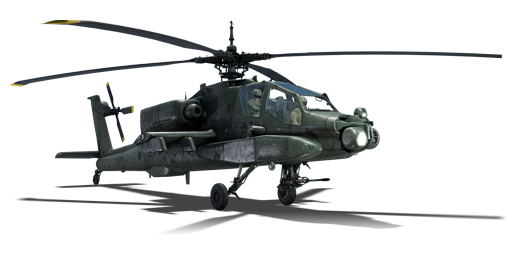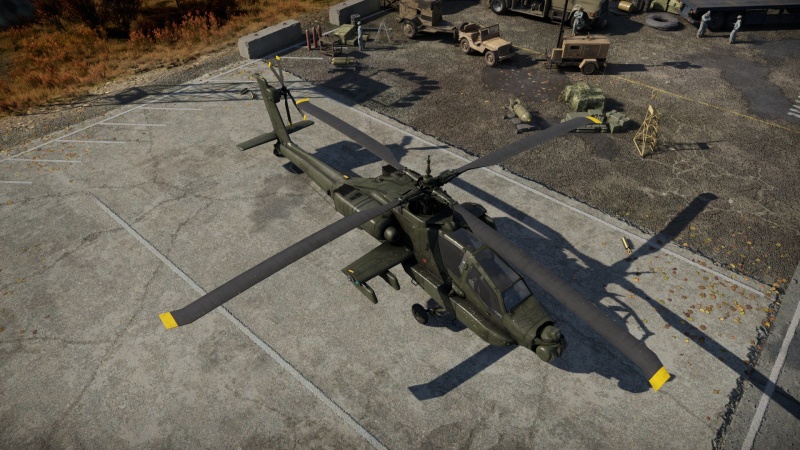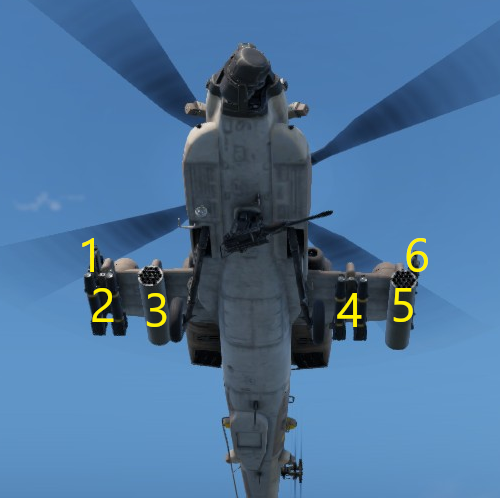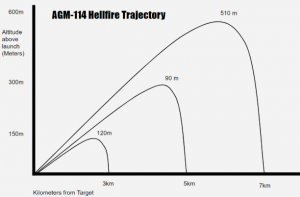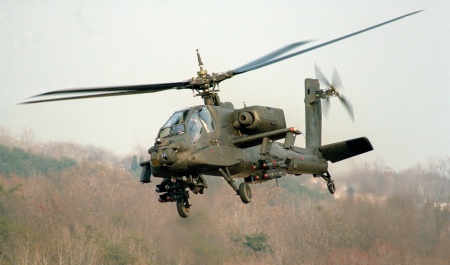Difference between revisions of "AH-64A"
SIUNEG_CZE (talk | contribs) (→Suspended armament) (Tag: Visual edit) |
(→Armaments: Reformatted) |
||
| Line 64: | Line 64: | ||
The '''''{{PAGENAME}}''''' is armed with: | The '''''{{PAGENAME}}''''' is armed with: | ||
| − | * A choice between | + | * A choice between two presets: |
| − | ** 1 x 30 mm M230E-1 cannon (1,200 rpg) | + | ** 1 x 30 mm M230E-1 cannon (1,200 rpg) + 30 x countermeasures |
| − | |||
** 1 x 30 mm M230E-1 cannon + 30 x countermeasures + IRCM | ** 1 x 30 mm M230E-1 cannon + 30 x countermeasures + IRCM | ||
| Line 72: | Line 71: | ||
{{Specs-Heli-Suspended}} | {{Specs-Heli-Suspended}} | ||
<!-- ''Describe the helicopter's suspended armament: additional cannons under the winglets, any bombs, and rockets. Since any helicopter is essentially only a platform for suspended weaponry, this section is significant and deserves your special attention. If there is no suspended weaponry remove this subsection.'' --> | <!-- ''Describe the helicopter's suspended armament: additional cannons under the winglets, any bombs, and rockets. Since any helicopter is essentially only a platform for suspended weaponry, this section is significant and deserves your special attention. If there is no suspended weaponry remove this subsection.'' --> | ||
| − | |||
| − | |||
| − | The '''''{{PAGENAME}}''''' can be outfitted with the following ordnance | + | The '''''{{PAGENAME}}''''' can be outfitted with the following ordnance: |
| − | |||
| − | |||
| − | |||
| − | |||
| − | |||
| − | |||
| − | |||
| − | |||
| − | |||
| − | |||
{| class="wikitable" style="text-align:center" width="100%" | {| class="wikitable" style="text-align:center" width="100%" | ||
|- | |- | ||
| Line 92: | Line 79: | ||
| rowspan="7" width="25%" | <div class="ttx-image">[[File:Hardpoints_AH-64A_(Israel).png]]</div> | | rowspan="7" width="25%" | <div class="ttx-image">[[File:Hardpoints_AH-64A_(Israel).png]]</div> | ||
|- | |- | ||
| − | ! Hydra-70 M247 rockets | + | ! [[Hydra-70 M247]] rockets |
| || 19 || 19 || 19 || 19 || | | || 19 || 19 || 19 || 19 || | ||
|- | |- | ||
| − | ! AGM-114B Hellfire missiles | + | ! [[AGM-114B Hellfire]] missiles |
| || 2, 4 || 2, 4 || 2, 4 || 2, 4 || | | || 2, 4 || 2, 4 || 2, 4 || 2, 4 || | ||
|- | |- | ||
| − | ! AIM-9L Sidewinder missiles | + | ! [[AIM-9L Sidewinder]] missiles |
| || 1 || || || 1 || | | || 1 || || || 1 || | ||
|- | |- | ||
| − | ! APKWS II (M151) missiles | + | ! [[APKWS II (M151)]] missiles |
| || 7 || 7 || 7 || 7 || | | || 7 || 7 || 7 || 7 || | ||
|- | |- | ||
| − | ! APKWS II (M282) missiles | + | ! [[APKWS II (M282)]] missiles |
| || 7 || 7 || 7 || 7 || | | || 7 || 7 || 7 || 7 || | ||
|- | |- | ||
| − | ! ATAS (AIM-92) missiles | + | ! [[ATAS (AIM-92)]] missiles |
| − | |2|| || || || ||2 | + | | 2 || || || || || 2 |
|- | |- | ||
|} | |} | ||
| + | |||
| + | {{Navigation-Start|Default weapon presets}} | ||
| + | {{Navigation-First-Simple-Line}} | ||
| + | * Without load | ||
| + | * 2 x AIM-9L Sidewinder missiles | ||
| + | * 4 x ATAS (AIM-92) missiles | ||
| + | * 76 x Hydra-70 M247 rockets | ||
| + | * 28 x APKWS II (M151) missiles | ||
| + | * 28 x APKWS II (M282) missiles | ||
| + | * 8 x AGM-114B Hellfire missiles | ||
| + | * 16 x AGM-114B Hellfire missiles | ||
| + | {{Navigation-End}} | ||
== Usage in battles == | == Usage in battles == | ||
Latest revision as of 20:21, 2 February 2024
| This page is about the American attack helicopter AH-64A. For other versions, see AH-64 (Family). |
Contents
Description
The AH-64A is a rank VI American attack helicopter with a battle rating of 10.3 (AB/SB) and 11.7 (RB). It was introduced in Update 1.97 "Viking Fury".
General info
Flight performance
| Characteristics | Max Speed (km/h at 1,000 m) |
Max altitude (metres) | |
|---|---|---|---|
| AB | RB | ||
| Stock | 275 | 257 | 5400 |
| Upgraded | 324 | 300 | |
Survivability and armour
The AH-64A Apache is fitted with armour consisting only of bulletproof glass in the pilot's windscreen and Kevlar boron carbide in the crew seats and cockpit. This armour provides only limited protection, mostly just against low-calibre weapons and fragmentation. It does not offer much protection against direct hits from guns larger than machine guns or against close detonations from fused anti-aircraft rounds.
- 22 mm bulletproof glass - pilot's windscreen
- 20 mm Kevlar boron carbide - pilot & gunner seats, cockpit floor and side panels
Modifications and economy
Armaments
| Ballistic Computer | ||
|---|---|---|
| CCIP (Guns) | CCIP (Rockets) | CCIP (Bombs) |
| |
|
|
Offensive armament
The AH-64A is armed with:
- A choice between two presets:
- 1 x 30 mm M230E-1 cannon (1,200 rpg) + 30 x countermeasures
- 1 x 30 mm M230E-1 cannon + 30 x countermeasures + IRCM
Suspended armament
The AH-64A can be outfitted with the following ordnance:
| 1 | 2 | 3 | 4 | 5 | 6 | ||
|---|---|---|---|---|---|---|---|
| Hydra-70 M247 rockets | 19 | 19 | 19 | 19 | |||
| AGM-114B Hellfire missiles | 2, 4 | 2, 4 | 2, 4 | 2, 4 | |||
| AIM-9L Sidewinder missiles | 1 | 1 | |||||
| APKWS II (M151) missiles | 7 | 7 | 7 | 7 | |||
| APKWS II (M282) missiles | 7 | 7 | 7 | 7 | |||
| ATAS (AIM-92) missiles | 2 | 2 |
| Default weapon presets | |
|---|---|
| |
Usage in battles
Overview:
The AH-64A is an excellent helicopter for attacking ground targets, and can also hold its own against many enemy aircraft. Through adequate use of cover, teamwork, and game sense, the Apache can easily dismantle enemy teams. An Apache pilot must understand all of the tools at their disposal.
The Apache has an arsenal of weapons. The most effective anti-tank weapon in the Apache's arsenal is the AGM-114 Hellfire, which uses a top attack trajectory to destroy ground vehicles. There is functionally very little difference between the AGM-114B and K variants, used on early and late Apaches respectively.
Staying Alive:
Flying the Apache effectively can be more difficult than most players would imagine. Trying to deal with threats from enemy air and ground vehicles while continuing to attack the enemy team can be difficult. If distracted, a pilot can quickly lose situational awareness. Being successful in the Apache requires situational awareness above all else. Due to the fragility of the helicopter, any blindspot can lead to a quick and sudden death. Additionally, the mobility of the Apache is adequate but not impressive, so evasive manoeuvres are not always effective.
Using cover is a very important part of staying alive in the Apache. Always stay behind a hill or building in ground battles. When exposing yourself in order to fire on the enemy, be mindful to not gain too much altitude. Most importantly, Always listen to your RWR. If you hear an alarm, take evasive action immediately.
Additionally, it is important to know when to use flares. Flares are extremely effective against heat-seeking missiles, but useless against any other missiles. It is the responsibility of the Apache pilot to recognize the threat and decide whether to use flares or not.
Air-to-Air (Heatseekers and Gun):
The Apache is surprisingly potent in air-to-air combat. Engagements should be conducted primarily through the use of the Stinger or AIM-9L missiles.
The Stinger is a simple but effective air-to-air missile. It has an excellent seeker head and can obtain all aspect lock on almost any air target within 3-5 km (even propeller aircraft with a low heat signature). However, the Stinger can be easily fooled by flares or outmanoeuvred by a fast enemy aircraft. The best way to use the Stinger against enemy aircraft is when they are heading directly towards you. If fired at the right second, most enemies will struggle to dodge a Stinger.
The AIM-9L is another great choice for shooting enemy aircraft. The AIM-9L is larger, faster, and more manoeuvrable. Additionally, the AIM-9L is more resistant to flares and countermeasures than the Stinger. The issue with this missile is the fact that it must be taken instead of other ordinances while the Stingers are carried on the side of the pylons.
If the enemy gets close, the 30 mm autocannon can be extremely effective. The gun will automatically aim with optical lock, so Apache pilots can aim accurately while taking evasive manoeuvres.
Close Range Air-to-Ground (Gun and Rockets):
At close range, the Apache has excellent offensive capability. The 30 mm autocannon is incredibly accurate even at surprisingly far distances. This cannon uses a High Explosive Dual Purpose round that can engage lightly armoured targets. Rocket pods can also be used, with the CCIP computer helping maintain accuracy even at further distances. Be careful when trying to use the Hellfire missile at close range. It can do a direct attack at closer ranges (rather than its usual top attack) but if fired at an odd angle, it may not have time to manoeuvre onto the target if fired at closer ranges.
The problem with trying to engage at close range is that doing so will put the Apache in huge amounts of danger. Enemy tanks will be able to quickly destroy the Apache with their main guns or anti-aircraft machine guns.
Long Range Air-to-Ground (Hellfire): At longer ranges, the Hellfire missile can be used to full effect. The Hellfire will guide on its target as shown in the attached diagram. This is known as top attack. Being that it takes this path to the enemy target, the Hellfire can take upward of 30 seconds to reach its target at longer ranges. Do not fire at enemies that are about to move to cover, and make sure to fire multiple missiles at once in order to deal maximum damage. Because the Hellfire is laser guided, multiple missiles can be fired at once. They should be fired at intervals of 5-10 seconds, where between missiles the Apache can switch to a new ground target. This will allow for the quick destruction of multiple enemies. This tactic can be incredibly effective. Although the time to target for the most recently fired Hellfire is available on the HUD, pilots will have to keep track of all the missiles they have fired by memory and quick calculations.
Combatting enemy anti-aircraft vehicles can be a challenge. Always remain in cover and move unpredictably in combat. Use the radar warning receiver to obtain the general direction of enemy AA, and then attack with a Hellfire. An effective strategy is to fire a Hellfire, break optical lock to gain cover and avoid counterfire, and then pop back up and get lock again several seconds before the Hellfire hits. This strategy if applied correctly will result in a hit, as the Hellfire is smart enough to begin following the laser designator again once the Apache re-obtains its lock.
Pros and cons
Pros:
- Excellent ground attack armaments like the unique Hellfire missile and accurate 30 mm cannon
- Adequate air-to-air capability with the Stinger or AIM-9L missiles
- Adequate speed and manoeuvrability
- Adequate countermeasure ability with Radar Warning Receiver and flares
- Good overall durability with two pilots
Cons:
History
The AH-64A Apache is the first variant of the famed AH-64 Apache attack helicopter. Designed by Hughes Aircraft, the AH-64 was built as a competitor in the US Army Advanced Attack Helicopter Competition, which it ultimately won. The Apache saw a variety of service in roles such as tank-killing and close air support, using a wide variety of munitions including Hellfire air-to-surface missiles and Hydra-70 unguided rockets. The AH-64A has been replaced by the AH-64D Apache Longbow, which benefits from improved combat capabilities.[1][2]
Design and developmentThe AH-64 was first conceived of in the early 1970s as a durable, capable advanced attack helicopter to succeed the Bell AH-1 Cobra. The helicopter was designed for the Advanced Attack Helicopter competition, a United States army tender for a new helicopter. After reviewing proposals, the army decided to allow only two bidders; Hughes' YAH-64 and Bell's YAH-63.[1] The YAH-64 was selected as the winner, as it was deemed to be slightly more durable. As a result, the US Army decided to order pre-production models. However, the actual pre-production took much longer than expected. Though the YAH-64 prototype first flew in 1975 and received a production order in 1976,[1] the selection of weapons and avionics tenders took an additional six years. Nevertheless, the Army approved a full production contract in 1982.
The YAH-64 was equipped with a tandem cockpit for the crew of two, a gunner/co-pilot and the pilot. The helicopter is powered by a single General Electric turboshaft driving a four-bladed propeller, allowing speeds of up to 296 km/h.[1] The landing gear is mounted in a tail-dragger configuration and cannot be retracted. The helicopter is armed with a single 30 mm M230 chain gun, as well as wing hardpoints for various underwing ordnance options including Hellfire ATGMs and Hydra-70 rockets.[1]
Operational history
The AH-64A began entering service in 1982, following the completion of the Advanced Attack Helicopter program. Full-scale production was started by 1983.[2] The helicopter went on to serve in a variety of conflicts, and distinguished itself as a highly capable ground attacker and air support vehicle. The Apache participated in both Operation Restore Hope and Desert Storm, as well as the 1989 action in Panama, where its advanced sensor capabilities proved to be valuable in night-time raids.[2] During Operation Desert Storm, Apache helicopters were responsible for destroying over 500 enemy armoured vehicles; they performed just as well during the liberation of Kuwait, destroying 245 enemy vehicles without any losses.[2]
The Apache was later fielded in the Middle East as well as in Bosnia, where it enjoyed continuous success. As well, it has been exported to many international customers, including Egypt, Greece, Israel, Saudi Arabia and the United Arab Emirates.[2] In total, McDonnell Douglas, who purchased Hughes Aircraft in 1984, delivered 937 AH-64A model Apaches: 821 to the United States, and 116 to international customers.[2]
In the 1990s, the AH-64D Apache Longbow began to enter service. It was designed as an advanced version of the Apache, carrying a prolific over-the-rotor fire control radar and the ability to mount fire-and-forget Hellfire Longbow missiles. As a result, almost all Apache-operating nations have converted their existing AH-64 helicopters to the AH-64D standard. The United States started converting their AH-64A Apaches starting from 1998, and all conversions were completed by 2008.[2] As a result, the AH-64A variant is now in limited service with foreign nations, and has been superseded by the more advanced AH-64D variant.[1]
Devblog
In the early 1970s, the US Army was keen to adopt a more powerful attack helicopter, with improved anti-tank capabilities and performance over the existing AH-1 Cobra in service at the time. As a result, the Army initiated the 'Advanced Attack Helicopter' (AAH) program in November of 1972, requesting design proposals from a number of prominent American helicopter manufacturers.
Subsequently, various designs were proposed by Bell, Boeing, Hughes, Lockheed and Sikorsky. Of all the proposals, the Army picked two designs for further development - the Hughes' Model 77 (YAH-64) and Bell's Model 409 (YAH-63).
After conducting their maiden flights on the 30th of September and the 1st of October, 1975, respectively, further testing of the two prototypes showed deficiencies in the fields of survivability and undercarriage stability on Bell's Model 409. As a result, Bell's design was excluded from the competition, while Hughes' design was declared as the winner of the AAH program in 1976.
Following this, work on refining the YAH-64's design continued throughout the late 1970s. As part of this further development, the YAH-64 was optimized for the use of the newly developed AGM-114 Hellfire missile, which was in development since 1974. By the end of the '70s and going into the early '80s, the AH-64 was considered ready for full scale production. In 1981, the first pre-production machines were built, while the first production models began rolling off the assembly lines in 1983. Since then, the Apache has been produced in a huge numbers, participating in virtually every scale military operation of the US Army: Panama, Iraq, Bosnia, Kosovo, etc. Israel became the first foreign operator of the Apache named AH-64 Peten, where this helicopter saw intense combat in Lebanon and Gaza strip.
Media
- Skins
- Videos
See also
- Related development
External links
References
- Citations
- Bibliography
- Editors of Vertipedia. (2020). Vertipedia - Boeing AH-64A Apache. Retrieved November 20, 2020, from https://vertipedia.vtol.org/aircraft/getAircraft/aircraftID/31
- Pike, J. (2000, May 29). AH-64 Apache. Retrieved November 20, 2020, from https://fas.org/man/dod-101/sys/ac/ah-64.htm
| Boeing Aircraft | |
|---|---|
| Aircraft | |
| Fighters | P-26A-33 · P-26A-34 M2 · P-26B-35 |
| Bombers | B-17E · B-17E/L · B-17G-60-VE |
| B-29A-BN | |
| Export | P-26A-34 · B-17G |
| Captured | ▅B-17E |
| Helicopters | |
| Attack | AH-64A · AH-64D |
| Export / Licensed | AH-64A (GR) · ▃AH-64A Peten · AH-64A Peten · ▅AH-64DJP · ▄AH Mk.1 · AHS |
| See Also | Tupolev Design Bureau · Westland Helicopters · Fuji Heavy Industries |
| For Boeing-built ships, see Boeing Marine Branch | |
| USA helicopters | |
|---|---|
| Attack | |
| Black Hawk | MH-60L DAP |
| Choctaw | H-34 |
| Cobra | AH-1F · AH-1G · AH-1Z |
| SuperCobra | AH-1W |
| Kiowa | OH-58D |
| Little Bird | AH-6M |
| Apache | YAH-64 · AH-64A · ▃AH-64A Peten · AH-64A (GR) · AH-64D |
| Utility | |
| Huey | UH-1B · UH-1C · UH-1C XM-30 |


